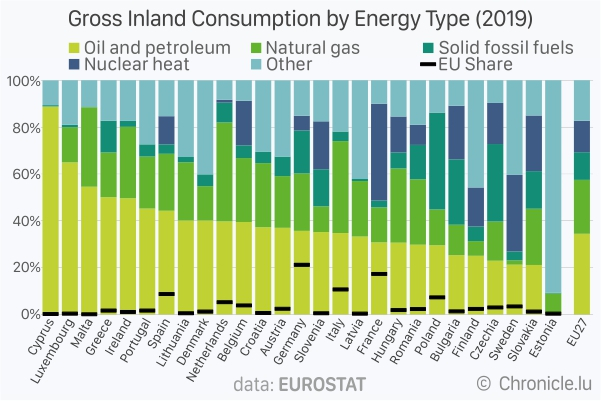
Despite a long-term downward trend, oil, petroleum products and natural gas made up over half the total energy consumption in the European Union (EU) whilst renewable energy sources continued to grow, data extracted from the European statistics agency Eurostat have shown.
Energy consumption decreased in 2020 due to COVID-19-pandemic related measures, especially in transport sector. Therefore, to determine the energy mix in EU Member States, the gross inland consumption for 2019 was used to assess the general dependency on a particular energy source.
Oil and petroleum products (34.47%, excluding biofuels) followed by natural gas (23.00%), remained the most significant energy source for the EU.
In 2019, the share of oil and petroleum products in gross inland consumption was highest in Cyprus (88.79%), Luxembourg (64.53%), Malta (54.53%) and Greece (50.10%), four Member States with over half their energy needs being met by oil and petroleum products alone. The smallest share of oil and petroleum products in gross inland consumption in 2019 was observed in Estonia (1.06%). All other Member States had at least 20% of their energy needs being sourced from oil and petroleum products.
Nearly a quarter (23%) of EU energy needs were sourced from natural gas in 2019, with the highest share observed in the Netherlands (42.25%), followed by Italy (39.21%), Malta (33.98%) and Hungary (31.70%). Luxembourg sourced 15.05% of its energy needs in 2019 from natural gas in 2019.
The use of solid fossil fuels like coal, lignite, oven coke, etc. has been decreasing over the years, making up only 11.80% of the share of total energy consumption in the EU in 2019. Poland was most dependent on solid fossil fuels (41.34%) for its total energy needs in 2019, whilst Latvia, Cyprus, Estonia and Malta saw less than 1% of their energy needs being sourced from solid fossil fuels in 2019.
Energy sourced from nuclear power plants remained diverse across the EU, with fourteen Member States reporting no or insignificant nuclear energy sources in their national inland consumption, while France sourced 41.37% of it total energy consumption from nuclear energy in 2019. Sweden (32.66%), Slovakia (23.78%), Bulgaria (22.9%) and Slovenia (20.45%) were the only other four Member States with over a fifth of their total energy needs being generated from nuclear heat.
In terms of the share of total EU gross inland consumption in 2019, Germany accounted for 21.15% followed by France (17.25%) and Italy (10.678). The smallest share of total EU gross inland consumption in 2019 was observed in Malta (0.06%), followed by Cyprus (0.18%), Luxembourg (0.31%) and Latvia (0.32%).








